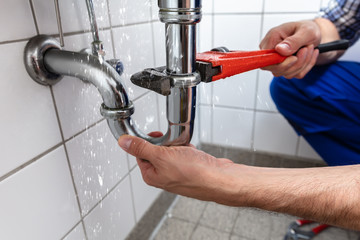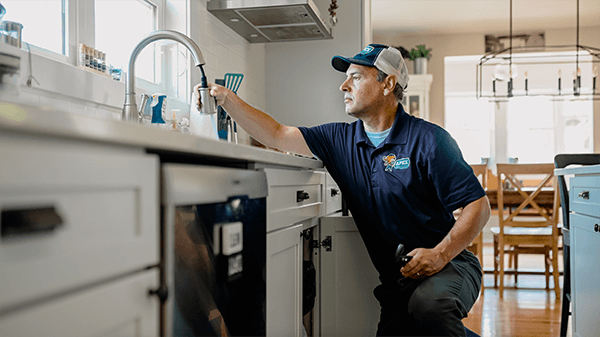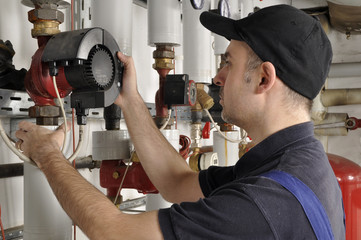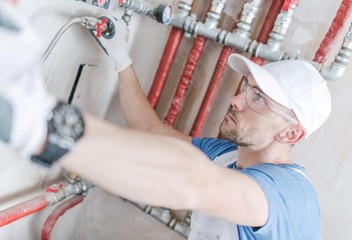When to Call a Plumber
Plumbers install, repair and maintain water and gas pipes and sanitation units in homes, offices, and factories. Plumber also helps design plumbing systems and ensure they meet local regulations.
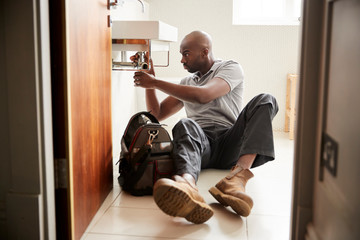
A plumber installs and repairs pipes that carry water, gas and waste to and from homes and businesses. They may also install plumbing fixtures such as bathtubs, sinks, toilets and dishwashers. In some states, plumbers must be licensed. Licensing requirements vary by state, but usually include passing an exam and gaining work experience. Some plumbers attend technical school to learn the skills of the trade.
Plumbers must be able to read blueprints and understand how to use power tools. They must be able to communicate effectively with customers, supervisors and other employees. They must also be able to think critically when evaluating problems and finding solutions. Other job duties include examining water pressure, testing for leaks and ensuring that all parts are installed correctly. Plumbers must be able to work independently or as part of a team.
Many plumbers are self-employed or work for small companies that employ fewer than ten people. Larger companies and government agencies may also hire these professionals. Some plumbers specialize in specific types of plumbing installations or repair work, such as sewer lines or septic systems.
Getting a job as a plumber requires a high school diploma or equivalent. Most plumbers gain work experience through an apprenticeship and receive on-the-job training. Some attend technical school to learn the skills of the profession, and some are members of labor unions that negotiate wages with employers.
In some areas, such as New York City, plumbers must be licensed to perform certain types of installation and maintenance work. The City Department of Buildings website has step-by-step instructions for becoming a licensed plumber in New York. The licensing process is similar in other cities, though regulations vary by state.
If a plumber works on sewage systems, they may encounter microorganisms that can cause infections, including cholera, typhoid and hepatitis. These bacteria are excreted in faeces and vomit, and enter the water supply through toilets and drains. Plumbers should wear protective clothing when working on sewage systems to prevent exposure to these diseases. They should also disinfect all tools and equipment after handling contaminated materials.
Plumbing professionals repair pipes and systems that carry water, sewage and heat. If you have a pipe that is leaking, running slow or making strange noises, it is time to call a plumber. Plumbers are also called to install new fixtures like bathtubs, toilets and sinks. They can handle anything from simple repairs to installing whole house repiping.
Plumbers are usually self-employed, but they can also find employment in large companies or government agencies. Military bases, hospitals and school districts employ plumbers as well. Most plumbers work on residential and commercial plumbing projects, but some specialize in one or the other. For example, a service and repair plumber is more likely to work on toilets and sinks than a new construction plumber.
Some plumbers prefer to work on residential plumbing, while others enjoy the challenges of working on large commercial or industrial projects. Residential and commercial jobs require different skills, and both can be very rewarding. Larger plumbing jobs are more complex, and they can involve a larger number of people. However, the rewards are greater as well.
Many plumbers are required to have a license to work in the field, and this can vary from state to state. Some plumbers may also choose to complete an apprenticeship program, which can last from two to five years. Apprenticeship programs give prospective plumbers hands-on experience while learning the trade from an experienced professional. In addition to technical training, plumbers need strong communication and problem-solving skills to succeed in the profession. They must be able to listen to their customers and understand their needs in order to make the most accurate repairs. This includes being able to identify the source of the problem and determine the best solution.
A plumber is an individual who repairs, installs and maintains pipes that carry water or other liquids. This includes pipes for drinking water, drainage and sewage. A plumber may also work on larger-scale plumbing projects like installing water supply lines to factories or office buildings. Plumbers are skilled at reading blueprints and able to fit, join or weld pipes using a variety of techniques. They are also required to meet certain standards of safety and building regulations.
Plumbers are often required to troubleshoot problems and identify the source of the problem, such as a clogged toilet or leaking pipe. This requires them to be observant and have good analytical skills. The ability to listen to customers and understand their needs is important as well. A plumber must also be able to weigh different solutions and determine which ones are best for the situation.
Plumbing is a trade that requires a lot of physical strength and stamina as well as technical skill. It’s not a career for everyone, but those who choose to become plumbers are usually very happy in their jobs. This is due to the fact that a plumber’s work is both rewarding and interesting, as they get to help people with their plumbing problems on a daily basis.
There are several routes to becoming a plumber, including completing a trade school program or an apprenticeship. However, it’s important to know that most states require a license for those who want to work as a plumber, and most apprentices will spend between two and five years training before they are ready to take on their own clients.
Many professional plumbers will stay in their positions for the rest of their careers, as they find it very fulfilling to help others with their plumbing problems. Some even continue working part-time well into retirement, helping the next generation of plumbers to learn their craft. For those interested in becoming a plumber, it’s important to research the different career paths and see what suits your personality and abilities. After all, a plumber is responsible for helping people with their water and sewage, so it’s important to have the right qualities to be successful in this occupation.
Plumbing problems can strike at any time, causing chaos and discomfort for homeowners. While some are easy to fix, others require the expertise of a professional. Knowing when to call in the experts can help you avoid costly repairs down the line.
Plumbers troubleshoot dysfunctional pipe systems and repair or replace them as needed. They may use hand or power tools to cut, measure, and bend pipes as well as soldering equipment to join them together. They often work in cramped spaces and must carefully balance their tools and materials to ensure safety.
One of the most common jobs for plumbers is repairing leaks in a home or business. These issues can be caused by a variety of factors, including old age, stress on the pipes from frequent use, or damage from other construction projects. It’s important for plumbers to have good eyesight and manual dexterity to properly fix these problems.
Another common problem is clogged drains or toilets. This can be caused by a number of things, including built-up sediment, tree roots, or simple sludge. It’s crucial for homeowners to regularly check their drains and toilets for signs of a blockage, such as water backing up into showers or sinks.
Plumbing issues can also include running toilets, low water pressure, or a noisy water heater. These issues can all be frustrating for homeowners, but ignoring them could lead to expensive repairs down the road. It’s important for plumbers to be able to listen and understand their customers’ needs so they can provide the best solutions. This requires excellent communication skills, as well as a strong understanding of how to repair and maintain plumbing systems.

